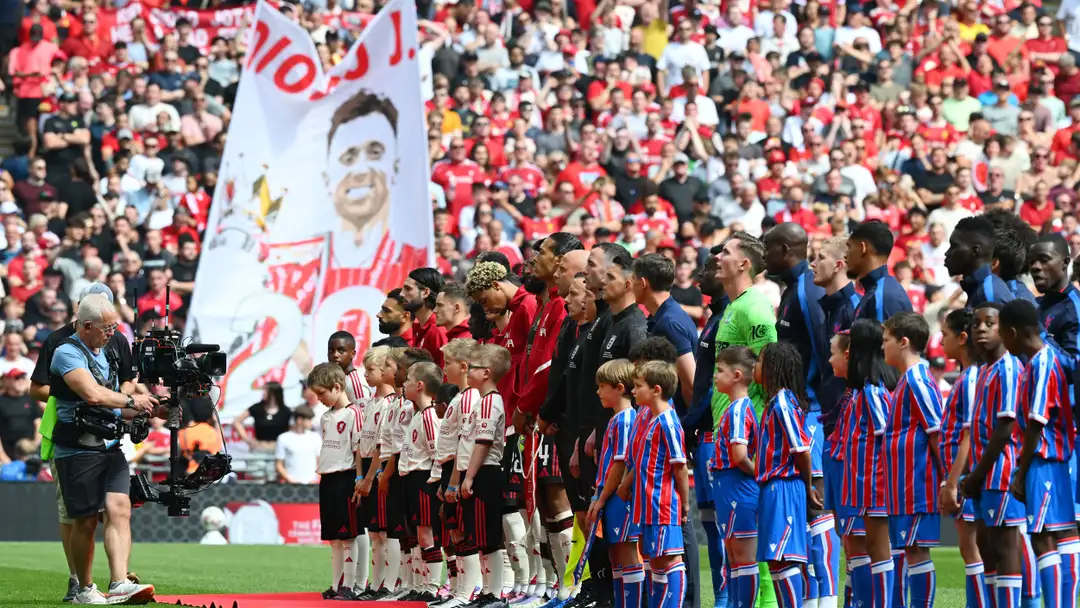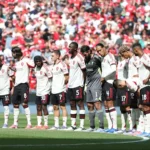Crystal Palace vs Liverpool Community Shield: The Minute’s Silence Controversy Explained

The 2025 FA Community Shield at Wembley Stadium was meant to be a celebration of football, marking the traditional curtain-raiser to the English football season. However, what should have been a respectful tribute to Liverpool’s Diogo Jota and Andre Silva turned into an unfortunate controversy that overshadowed the match itself. The incident, which saw a minute’s silence cut short due to disruption from some supporters, has sparked widespread discussion about fan behavior, stadium management, and the complexities of organizing major football events.
On a sweltering Sunday afternoon at Wembley, as Crystal Palace and Liverpool prepared to face off for the Community Shield, match referee Chris Kavanagh made the decision to observe a minute’s silence in tribute to Diogo Jota and Andre Silva. What followed was an uncomfortable scene that left players, officials, and viewers across the nation questioning what had gone wrong.
The silence, intended as a mark of respect, was disrupted by audible boos from sections of the crowd. The disruption was significant enough that referee Kavanagh felt compelled to cut the tribute short, creating an awkward moment that reverberated throughout the stadium and beyond. Television cameras captured the uncomfortable expressions of players from both teams, with some visibly shaking their heads in disappointment.
Liverpool manager Arne Slot, in his characteristic diplomatic style, attempted to play down the incident in post-match interviews. However, his captain Virgil van Dijk was far less restrained in his response. The Dutch defender issued what can only be described as a scathing condemnation of the supporters responsible for the disruption, expressing his deep disappointment at the lack of respect shown during what should have been a solemn moment.
Van Dijk’s reaction reflected the sentiment of many within the football community, who viewed the booing as an unacceptable breach of sporting etiquette. The incident quickly became a talking point across social media platforms, with fans from various clubs weighing in on what they perceived as inappropriate behavior from a section of the Crystal Palace support.
However, as more details emerged in the days following the match, a more complex picture began to develop. Far from being a deliberate act of disrespect, the disruption appeared to be the result of a series of organizational failures that created the perfect storm for controversy.
The primary issue, according to multiple reports and fan testimonies, was a catastrophic failure of the ticketing system at Wembley Stadium. This technical malfunction had far-reaching consequences that extended well beyond simple inconvenience. Hundreds of Crystal Palace supporters found themselves trapped in lengthy queues outside the stadium, unable to gain entry despite holding valid tickets for the match.
The scale of the problem became apparent as the afternoon progressed. Some supporters reported waiting in queues for over an hour in temperatures that reached uncomfortable levels under the August sun. The heat, combined with the frustration of missing the start of a major final, created an atmosphere of tension and irritation among the Palace faithful who had traveled from across the country to support their team.
Perhaps most significantly, many fans were still on the concourse or in the entrance areas when the minute’s silence began. These supporters, having just gained entry to the stadium after extended delays, were unaware that a tribute was taking place on the pitch. Some were still making their way to their seats, while others were catching their breath after the ordeal of getting into the ground.
The timing of the tribute proved particularly problematic. Unlike other major matches where such ceremonies are widely publicized in advance, there appears to have been a communication breakdown regarding the minute’s silence for Jota and Silva. This lack of clear communication meant that supporters who were dealing with entry issues were completely unprepared for what was happening on the field.
One of the most damning aspects of the entire incident was the apparent lack of communication about the planned tribute. Peter Saysell, vice-chair of the Crystal Palace Independent Supporters Association (CPISA), provided crucial insight into this aspect of the controversy. His statement revealed a significant organizational oversight that contributed directly to the problems that followed.
According to Saysell, Crystal Palace supporters were given no advance notice that a minute’s silence would be observed. This information was not included in the match program, nor was it communicated through any of the usual channels that fans rely on for pre-match information. There were no announcements about wreath-laying ceremonies or tributes, leaving supporters completely unaware of what was planned.
This communication failure had cascading effects throughout the stadium. Supporters who might normally have prepared themselves mentally for a moment of silence, or who might have made extra efforts to be in their seats before kick-off, had no way of knowing such preparations were necessary. The element of surprise, combined with the ongoing entry issues, created a situation where respectful participation became virtually impossible for many fans.
The absence of information in official channels also meant that fan groups and supporters’ associations, who often help coordinate appropriate behavior during sensitive moments, were unable to prepare their members. These organizations typically play a crucial role in ensuring that their supporters understand the significance of tributes and ceremonies, but they were left as much in the dark as individual fans.
The implications of this communication breakdown extend beyond the immediate incident. It raises serious questions about the coordination between different stakeholders in major football events, including the Football Association, the participating clubs, stadium management, and supporter groups.
The human cost of the organizational failures becomes clear when examining individual supporter experiences. Richard Bryne, a long-time Crystal Palace fan, provided a particularly poignant account of his experience to The i Paper. His story illustrates how the problems affected real people who had invested significant time, money, and emotional energy in attending what was a historic occasion for their club.
Bryne missed the first twenty minutes of the match due to the entry delays, an experience that left him frustrated and disappointed. His comments reveal the deeper significance of such missed moments for football supporters. As he pointed out, if this had been a cup final rather than the Community Shield, the impact would have been even more devastating. For supporters who have waited decades to see their team in a major final, missing even a few minutes can mean losing moments that will never be repeated.
The psychological impact on supporters cannot be understated. Many Palace fans had waited years to see their team compete in a major final at Wembley. The Community Shield represented a significant achievement for a club that has often operated in the shadow of larger, more successful neighbors. To have that experience marred by organizational failures and the subsequent controversy was deeply disappointing for the travelling support.
Bryne’s measured response also highlights the maturity of many supporters in dealing with the situation. Despite his frustration, he acknowledged that the friendly nature of the Community Shield helped keep emotions in check. This perspective suggests that the problems could have been even more serious if they had occurred during a more high-stakes fixture.
The experience of supporters like Bryne also demonstrates the ripple effects of poor event management. When fans are forced to deal with technical failures, long queues, and missed action, their overall experience is significantly diminished, regardless of the eventual outcome of the match.
The response from organized Crystal Palace supporter groups in the aftermath of the incident demonstrates a level of responsibility and accountability that was notably absent from the event organization itself. The Five Year Plan, one of Palace’s most prominent fan groups, issued a public statement on social media that acknowledged the problems while offering a sincere apology for what had occurred
Their statement on X (formerly Twitter) provided crucial context that was missing from much of the initial media coverage. By explaining that many fans had difficulty entering the ground and that stewarding was inadequate, they helped shift the narrative from one of deliberate disrespect to one of organizational failure. The group’s admission that some supporters came into the concourse without realizing what was happening helps explain how the disruption occurred without malicious intent.
The apology itself was significant in its sincerity and completeness. Rather than making excuses or deflecting blame, the Five Year Plan took responsibility while also explaining the circumstances that led to the problem. This approach demonstrated the kind of mature leadership that supporters’ groups can provide in difficult situations.
The Crystal Palace Independent Supporters Association also played an important role in providing context and explanation. Through Peter Saysell’s comments, they highlighted the systemic issues that contributed to the incident, particularly the lack of communication about the planned tribute. Their involvement helped ensure that the supporter perspective was represented in the broader discussion about what had gone wrong.
These responses from organized supporter groups stand in stark contrast to the silence or defensive reactions that might be expected in such situations. Instead, they demonstrated accountability and provided valuable insights that helped the football community understand the complexities behind the incident
The Community Shield incident raises important questions about the organization and management of major football events. The problems experienced at Wembley are not isolated incidents but part of a broader pattern of issues that have affected various venues and competitions in recent years.
Ticketing system failures have become an unfortunately common occurrence at major sporting events. The technology that should make entry smoother and more efficient sometimes becomes the source of significant problems, particularly when backup systems are inadequate or when staff are not properly trained to deal with technical failures.
The incident also highlights the importance of clear communication in event management. When thousands of people are converging on a single location, coordination between different stakeholders becomes crucial. The failure to properly communicate the minute’s silence demonstrates how small oversights can have significant consequences.
Stadium management practices also come under scrutiny in light of the Palace supporters’ experiences. The adequacy of stewarding, the management of crowd flows, and the provision of information to supporters are all areas where improvements could be made. The fact that some fans were still entering the stadium at half-time suggests that the systems in place were fundamentally inadequate for the number of people trying to attend.
The incident serves as a case study in how multiple small failures can combine to create a much larger problem. Each individual issue – the ticketing failure, the communication breakdown, the inadequate stewarding – might have been manageable on its own. Together, they created a situation that was almost impossible to resolve satisfactorily
Despite the controversy surrounding the minute’s silence, the match itself provided an exciting conclusion to the day’s events. Crystal Palace ultimately emerged victorious, winning the Community Shield in a penalty shootout after the match ended in a draw. For Palace supporters, this represented a significant achievement and provided some compensation for the frustrations experienced earlier in the day.
The victory was particularly meaningful for Crystal Palace as a club and for their supporters. The Community Shield may be viewed by some as a glorified friendly, but for clubs outside the traditional “big six,” winning any trophy at Wembley represents a significant milestone. The fact that Palace were able to overcome both Liverpool and the off-field controversies to lift the trophy demonstrated considerable character.
Liverpool’s response to both the incident and the defeat was generally measured and professional. Manager Arne Slot’s diplomatic handling of the minute’s silence controversy helped prevent the situation from escalating further, while his team’s performance on the pitch suggested they would not be significantly affected by the experience.
The match result also provided an interesting narrative for the start of the Premier League season. Both teams would take different lessons from their Wembley experience as they prepared for their respective league campaigns.
The Community Shield incident offers several important lessons for the future organization of major football events. The most obvious is the critical importance of robust backup systems for ticketing and entry procedures. When primary systems fail, alternative arrangements must be immediately available to prevent the kind of delays experienced by Palace supporters.
Communication protocols also need to be reviewed and improved. The failure to properly inform supporters about planned tributes represents a basic oversight that should not occur at major events. Clear, consistent communication through multiple channels is essential to ensure that all stakeholders are properly informed about important ceremonial elements.
Staff training and preparation represent another area for improvement. Stewarding issues were specifically mentioned by Palace supporters as contributing to their problems. Ensuring that all personnel are properly briefed and equipped to deal with various scenarios is crucial for successful event management.
The incident also demonstrates the value of working closely with supporter groups and organizations. These groups have deep knowledge of their communities and can provide valuable insights into how to manage large numbers of fans effectively. Their involvement in planning and communication can help prevent many problems before they occur.
The minute’s silence controversy at the 2025 Community Shield serves as a reminder of the complexities involved in organizing major football events. What initially appeared to be a straightforward case of disrespectful behavior from supporters proved to be the result of multiple organizational failures that created an impossible situation for many fans.
The response from Crystal Palace supporter groups, with their willingness to accept responsibility while explaining the circumstances, demonstrates the maturity and integrity that exists within football fan culture. Their approach contrasts favorably with the organizational failures that created the problem in the first place.
The incident ultimately highlights the need for better planning, communication, and execution in major football events. While the controversy was unfortunate and embarrassing for all involved, the lessons learned can help prevent similar incidents in the future.
For Crystal Palace supporters, the day ended with their team lifting a major trophy, providing a positive conclusion to what had been a difficult experience. For the broader football community, the incident serves as a valuable case study in event management and the importance of considering the supporter experience in all aspects of match organization.
The true test of how well these lessons have been learned will come in future major events, where the systems, communication protocols, and management practices put in place must demonstrate that the problems experienced at Wembley have been addressed effectively and comprehensively.















